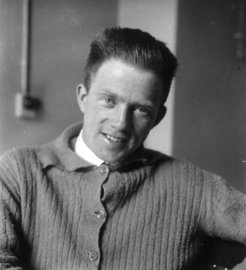Werner Heisenberg
1901 Würzburg (Germany) – 1976 Munich (Germany)
Physicist, Nobel Prize in Physics 1932
Country: Germany

Heisenberg formulates the uncertainty principle in 1927 and thus becomes a pioneer in quantum mechanics. He soon enters into contact with the leading nuclear physicists. He init- ially obtains his doctorate under Arnold Sommerfeld and then works as an assistant to Max Born in Göttingen. Berlin-Dahlem also establishes itself as a centre for this new field of research with the Kaiser Wilhelm Institute for Physics, which he managed from 1942. He is effectively head of the German nuclear research programme from 1939 and thus attracts great interest from the military.
During a meeting at Harnack House in 1942, Heisenberg offers the military little hope of soon developing the much-coveted super-weapon, the nuclear bomb. From then on, the Dahlem-based nuclear scientists concentrate on constructing a nuclear reactor. Heisenberg keeps the Third Reich at a distance as far as possible. After the War, he continues his career at the Max Planck Society. His institute in Berlin continues its work, firstly in Göttingen, and later in Munich as the Max Planck Institute of Physics.











